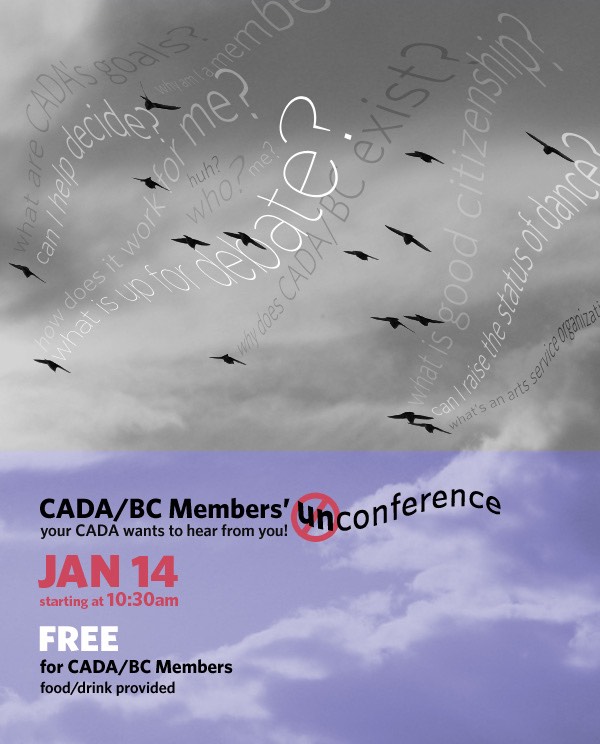CADA/West > Info > About > History > Members' Unconference


What does it mean to be part of a dance community?
As dancers you have a very specific role and life-style requirements. You need to take class, keep yourselves fed and healthy, look for dance work and make sure it fits it in with the other work you have to do to make ends meet.
And you have to understand the symbiotic nature of the community – who the other players are, how their roles fit into and around yours, and what their concerns and issues are. You are one piece of a puzzle, so you need put it together.
But also, and I’d like to concentrate on this today:
What does it mean to be part of the larger community?
And by this I mean you as an individual citizen, someone who lives in our society and whose work happens to be as a dancer.
My interest is in backing up and out of the day-to-day concerns of the dancer, and taking a broad view of the sector as part of a healthy and sane society.
Because the arts and culture sector requires government funding support in order to thrive, we need to think about what that means, especially in the economic and political climate in which we live.
We are faced right now, in this province and this country, with a crisis in the funding of the arts. The governments of the day have moved and continue to move in a direction that not just marginalizes art, but actually degrades and dismisses it as non-essential. Government funding is shrinking and one reason that’s given is that it does not significantly impact on citizens (“ordinary Canadians” is the term used). Essentially, that it does not matter.
We know, in our bones and our muscles and nerves, that it does. But can we articulate that? And not just to our colleagues, our friends and family, our audiences, our funders, but to those completely outside the sector?
We all struggle with the negotiation of looking out of our own careers while participating in a larger community.
I’d like to suggest that it is the responsibility of each of us to champion the larger issue of arts and culture as an essential part of a healthy civilization. Not because we are involved in it, but because we truly believe in the power of the arts to move people and change the world.
So, I am proposing three things we can each do:
1. Commit to bringing (one way or another) at least one person who has never been to a dance show to every show you are in or attend.
Because the first barrier to understanding is ignorance or inexperience. How many of you have had the great privilege of experiencing the response of someone who has just seen a dance show for the first time? I have, and a standard response is: “I had no idea. This is amazing. I was so moved. How can I see more of this?”
2. Regularly invite “outsiders” and “neophytes” to workshop presentations and open rehearsals, and TALK to them about it before and afterwards.
Widening the circle of experience is essential, as is the development of relationships that can deepen a person’s understanding and enjoyment of dance. We can do this. Maybe we are the only ones who can. If we don’t, who will?
3. Engage in dialogue with people you meet on a daily basis, not only about your choice of career but also about your conviction that the arts are an essential part of a civil society. How do your dentist, your doctor, the local grocer or barista feel about the arts? Have they ever been to a live performance? Can you help them get to one?
Because we know about this and live it every day, we must become articulate and active, and become ambassadors. Not to save our jobs, or even the sector, but to save the world.